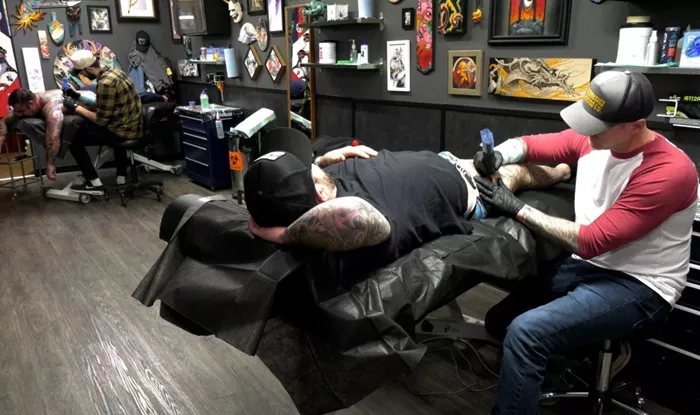In an effort to combat human trafficking, Tennessee lawmakers have proposed a new bill that aims to empower tattoo artists to help identify and support trafficking victims. East Nashville tattoo artist English Cousins is one of the passionate voices backing the bill, sharing her personal experience with survivors and explaining how tattoo artists can play a crucial role in saving lives.
For Cousins, tattooing isn’t just about creating art—it’s about helping people regain control of their bodies and feel empowered. “Tattooing is something that I love, and I relish the opportunity to be able to help people feel a sense of joy or empowerment about their body,” she said.
However, Cousins’ view of the art form was shaken when she learned how tattoos were being misused by traffickers. She described how women who have been trafficked often bear tattoos that serve as “brands,” marking them as property. These tattoos can range from names or symbols to barcodes, all designed to dehumanize the individuals.
Her experience with human trafficking survivors began when she moved to Tennessee and worked at a shop that partnered with an organization called End Slavery Now. This nonprofit organization allowed Cousins to create cover-up tattoos for survivors, helping them reclaim their bodies and identities. She recalled how some women shared stories of being drugged and waking up to find they had been branded without consent.
“The art that I love used in such a negative way really broke my heart,” Cousins said.
This personal experience fueled her support for a proposed bill, which would require Tennessee tattoo artists to undergo a minimum of one hour of human trafficking identification training. The idea is to equip artists with the knowledge needed to spot signs of trafficking and offer support to potential victims.
Cousins shared that, as a young artist, she didn’t fully understand the potential dangers within the industry. “It really wasn’t until I was working with these women and hearing their stories that I had the realization that I had actually inadvertently, early in my career been a part of that process for someone myself,” she admitted.
Her concerns are shared by local authorities. According to Kate Trudell, Director of the Community Coalition Against Human Trafficking, Tennessee has seen a rise in trafficking cases. “In 2024, for the year, we received 647 new reports of trafficking compared to 540 the previous year,” Trudell said, emphasizing the importance of having more trained professionals who can recognize the signs of trafficking.
The proposed bill, known as “The Ink of Hope Act,” would require tattoo artists to take training that helps them spot potential trafficking situations. Trudell noted that when tattoo artists are educated about human trafficking, they can play a crucial role in identifying victims, especially since many victims seek tattoos as a way to reclaim their bodies or escape their past.
Cousins and Trudell both agree that investing just an hour to learn about human trafficking could have a monumental impact. “I think we can all afford to give an issue like this, 15 minutes to an hour of our time if it means helping end a cycle of violence and potentially saving someone’s life,” Cousins said.
The bill has already passed its first consideration and is now awaiting two more votes before it can be passed into law. For Cousins and other advocates, the potential for tattoo artists to act as a first line of defense against human trafficking could make a real difference in saving lives and offering victims a way out of their horrific situations.
Related topics:

